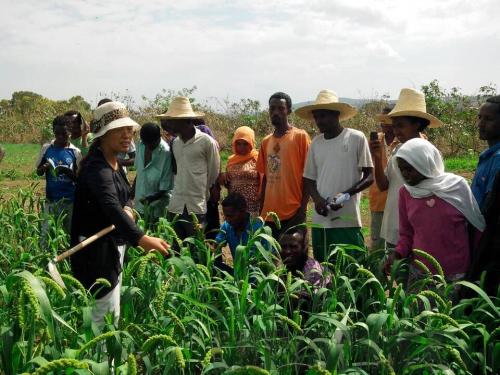| 
Zhang Maoqing (front left) shows teachers of Alage ATVET College how to grow millet
Bringing in advanced foreign technology and talent is a good way to improve a country's agricultural production. That is what Ethiopia is doing by cooperating with China. In 2001, the two governments launched the Chinese Agricultural Technical and Vocational Education and Training (ATVET) program in Ethiopia and since then, more than 100 Chinese agricultural technicians and experts have worked in the Horn-of-Africa country to train college teachers and students.Zhang Maoqing, who has been teaching in the Alage ATVET College south of capital Addis Ababa for nine years, is one of them. She shared her views on the program and agricultural development in Ethiopia with ChinAfrica reporter Ni Yanshuo.
ChinAfrica: What challenges does Ethiopia face to develop its agriculture? What technologies are important for the country?
Zhang Maoqing: The first challenge is Ethiopia's weak agricultural infrastructure. There is effective irrigation in no more than 10 percent of farmland. In other places, farmers have to depend on rain.
In addition, the agricultural input - improved seed varieties, fertilizers and pesticides - is severely inadequate. As the domestic industry is undeveloped, fertilizers and pesticides are mainly imported and cost two to three times higher than in China. So Ethiopian farmers cannot afford them.
Another challenge is the slow popularization of new technologies. Owing to the lack of textbooks, agricultural technicians don't have what is needed to promote modern technology.
To make things worse, owing to the lack of farmland protection and over-farming, desertification is a serious problem.
I think Ethiopia should develop its agriculture through scientific planning. It should protect farmland in different ways, prevent desertification and improve infrastructure. Promoting and popularizing advanced agricultural technologies and improving farmers' skills are also very important. Technologies for water-saving irrigation, fertilizing, pest prevention and control, and agricultural product processing should be widely promoted.
What is the nature of your work?
Before coming to Ethiopia, I worked in the Shaoshan Bureau of Agriculture of Hunan Province, doing comprehensive agricultural development, preventing and treating crop diseases and pests, and educational work. For this program too, I do similar work, but mainly in education and technology demonstration.
While working here, I have participated in writing textbooks. For example, I contributed a section on pest and weed prevention and control for a textbook on horticulture and crop production. I also wrote teaching manuals on plant protection and growing crops and vegetables as well as teaching materials related to drip fertilization and tea processing. All these textbooks and teaching materials are shared with local teachers so that they can use them to improve their theoretical levels.
I also teach [Ethiopian] students and train local agricultural college teachers based on these materials.
In addition, I promoted and demonstrated technologies for higher production of millet, sunflower, corn and Chinese sorghum in ATVET colleges in Alage, Asella, Sodo and Dilla.
How do you look at the ATVET program? How can it promote agricultural cooperation between China and Ethiopia?
The program is of great significance as through it we can introduce advanced and suitable Chinese agricultural technologies to Ethiopia. The condition in Ethiopia is similar to that in China before reform and opening up in the late 1970s. We can use China's advanced agricultural technologies to deal with food insecurity and eliminate poverty.
We have demonstrated and promoted the useful agricultural technologies that have been widely used in China for years, such as good variety breeding of corn, plastic mulching [a process to suppress weeds and conserve water], herbicide, and comprehensive prevention and treatment of insect pests in Ethiopia. These technologies can help Ethiopia's intensive farming.
The program can also help teachers and students in agricultural vocational colleges improve their theoretical levels and operational skills. Students from agricultural vocational colleges are the backbones of the agricultural technology training centers for farmers. They can widely promote and utilize advanced and suitable agricultural technologies, which can increase farmers' incomes and improve their livelihoods.
|